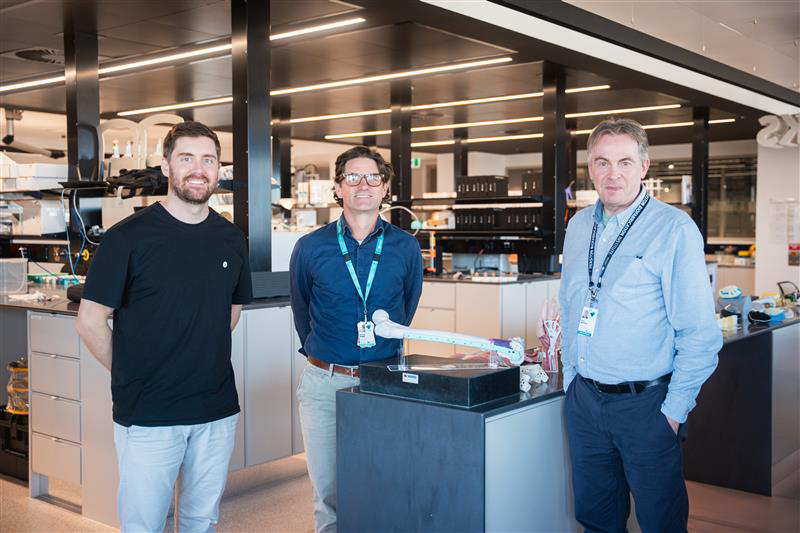HBI and Churchill Fellowship recipient share 3D printing expertise

HBI Industrial Designer Liam Georgeson, HBI Clinical Director Michael Wagels and Churchill Fellowship recipient Dr Peter Metherall
Metro North Health’s Herston Biofabrication Institute (HBI) is expanding its global reach and reputation in high quality surgical modelling, hosting visiting Churchill Fellow Dr Peter Metherall in October.
Dr Metherall, whose fellowship topic is From Printer to Patient: Transforming Surgery with Realistic 3D Models, travelled from the United Kingdom (UK) to Brisbane to meet with the HBI team.
As part of the visit, the HBI team shared their expertise on using 3D printing technology to help clinical teams plan surgical procedures.
Dr Metherall has spent over a decade developing 3D printing services at Sheffield Teaching Hospital, in the UK, primarily focusing on translating imaging data into physical models that support surgical planning, device design, and education.
The Churchill Fellowship recognises individuals who can bring back global learning to drive change in the UK, with Dr Metherall being awarded the fellowship to explore how advanced 3D printing technologies are being used internationally for surgical training and patient-specific care.
Dr Metherall said that the Fellowship has provided an exciting opportunity to learn directly from institutions that already use the technology extensively, so Sheffield Teaching Hospital and beyond can adopt best practices that have already been developed.
“My goal is to revolutionise how surgical training is delivered in UK hospitals. By learning from international pioneers, I want to introduce anatomically accurate, ethically produced, and customizable 3D printed models that can replace animal and cadaveric specimens,” he said.
“These models allow realistic, repeatable, and safe rehearsal of complex procedures improving surgical skill and patient safety. I also want to explore how these models can be used clinically for pre-surgical planning and risk reduction.”
Dr Metherall said that Australia, particularly institutes like HBI, has been very proactive in embedding 3D printing into both clinical and educational pathways.
“There’s a strong culture of collaboration between clinicians, engineers, designers and researchers, and integration with universities and hospitals is seamless,” he said.
“In the UK, we have excellent innovation but often more fragmentation and regulatory uncertainty, which slows adoption. The Australian model demonstrates how co-location and shared resources can accelerate translation into clinical benefit.
“The most striking lesson I learnt as part of my visit to HBI has been the power of true interdisciplinary working—how engineers, industrial designers, clinicians, and scientists at HBI collaborate daily in the same space, accelerating innovation. Their focus on co-design with clinicians ensures that every model serves a real surgical need.”
HBI Clinical Director Dr Michael Wagels said the visit was beneficial in many ways, including providing an opportunity for the Institute to learn about itself and helping cement their reputation as one of the premier point-of-care medical device manufacturing centres in the world.
“I visited Pete in Sheffield back in 2019 and he was very generous with his time and knowledge. I learned an enormous amount from that trip, much of which has informed how HBI functions today. I always wanted to return the favour,” Dr Wagels said.
“The benefit of having such an experienced observer take a deep dive on our systems and processes has meant that we get very detailed feedback on the things we are doing well and the areas where we can improve.
“It also opens up opportunities for international collaborations on projects of strategic and scientific importance. This will hold us in good stead as we work towards major grant applications in the coming years.
“The point of care medical device manufacturing community is relatively small worldwide at the moment, but growing very quickly. I think that it is important that we stick together and learn from each other.”
Congratulations to Dr Metherall on a successful Churchill Fellowship and we wish him all the best for his onward travels.
